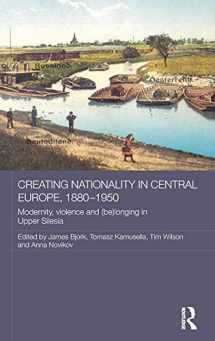
Creating Nationality in Central Europe, 1880-1950: Modernity, Violence and (Be) Longing in Upper Silesia (Routledge Studies in the History of Russia and Eastern Europe)
ISBN-13:
9780415835961
ISBN-10:
0415835968
Edition:
1
Author:
Timothy Wilson, Tomasz Kamusella, James Bjork, Anna Novikov
Publication date:
2016
Publisher:
Routledge
Format:
Hardcover
252 pages
Category:
Human Geography
,
Social Sciences
FREE US shipping
Book details
ISBN-13:
9780415835961
ISBN-10:
0415835968
Edition:
1
Author:
Timothy Wilson, Tomasz Kamusella, James Bjork, Anna Novikov
Publication date:
2016
Publisher:
Routledge
Format:
Hardcover
252 pages
Category:
Human Geography
,
Social Sciences
Summary
Creating Nationality in Central Europe, 1880-1950: Modernity, Violence and (Be) Longing in Upper Silesia (Routledge Studies in the History of Russia and Eastern Europe) (ISBN-13: 9780415835961 and ISBN-10: 0415835968), written by authors
Timothy Wilson, Tomasz Kamusella, James Bjork, Anna Novikov, was published by Routledge in 2016.
With an overall rating of 4.3 stars, it's a notable title among other
Human Geography
(Social Sciences) books. You can easily purchase or rent Creating Nationality in Central Europe, 1880-1950: Modernity, Violence and (Be) Longing in Upper Silesia (Routledge Studies in the History of Russia and Eastern Europe) (Hardcover) from BooksRun,
along with many other new and used
Human Geography
books
and textbooks.
And, if you're looking to sell your copy, our current buyback offer is $0.3.
Description
In the immediate aftermath of the First World War, Upper Silesia was the site of the largest formal exercise in self-determination in European history, the 1921 Plebiscite. This asked the inhabitants of Europe’s second largest industrial region the deceptively straightforward question of whether they preferred to be Germans or Poles, but spectacularly failed to clarify their national identity, demonstrating instead the strength of transnational, regionalist and sub-national allegiances, and of allegiances other than nationality, such as religion. As such Upper Silesia, which was partitioned and re-partitioned between 1922 and 1945, and subjected to Czechization, Germanization, Polonization, forced emigration, expulsion and extermination, illustrates the limits of nation-building projects and nation-building narratives imposed from outside. This book explores a range of topics related to nationality issues in Upper Silesia, putting forward the results of extensive new research. It highlights the flaws at the heart of attempts to shape Europe as homogenously national polities and compares the fate of Upper Silesia with the many other European regions where similar problems occurred.


We would LOVE it if you could help us and other readers by reviewing the book
Book review

Congratulations! We have received your book review.
{user}
{createdAt}
by {truncated_author}


